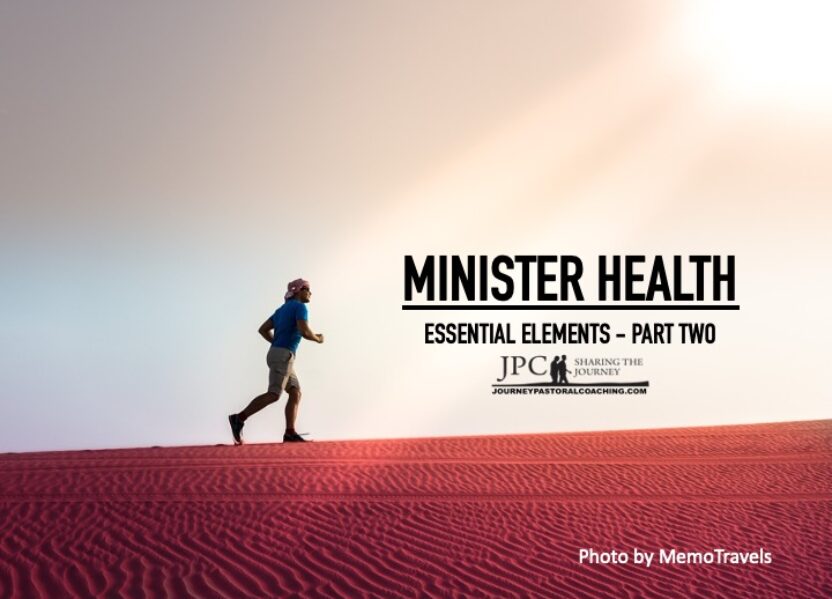Minister Health Part Two
In my previous article, I addressed the essential elements needed for living a healthy life in vocational ministry today. As a pastoral coach who focuses exclusively on young ministers, the ten essentials I share—five in this article and the five presented in my previous article—require the careful attention of young ministers in America right now, immediately.
Click to read Part One of this two-part series on Minister Heath
This list of ten essential elements is not exhaustive but rather a “Titanic” one: these are the icebergs I see in the immediate path of most young ministers today. Let each minister of the Gospel take heed and, so, take action, or their ministry may well be a Titanic one (but not in the way they think).
Here’s the second half of my list. At least one of these is sure to get your blood going.
6. Prioritize relationships.
“Then God said, ‘Let us make man in our image, after our likeness.'” Genesis 1.26
Father, Son, and Holy Spirit—God in three persons. They work together in a shared mission. They walk together in mutual love. Relationship is who they are and what they do: being and doing are one.
Pastor, you may work with people, but do you walk with them? Do you even know each other?
You talk skill sets, but do you talk about how your soul sets? You talk with each other about programs but do you talk with each other as friends: how things are with your souls, families, and just everyday life?
How is it that a 2023 Barna study found 65% of ministers confess to feeling lonely and isolated? (https://www.barna.com/research/pastor-support-systems/)
These findings are not unique; many studies have repeated them over the years. Studies continue to demonstrate the deleterious effect of loneliness on our mental, emotional, and even physical health.
How can we allow this to continue when we know isolation is the number one killer of ministers, a veritable “Pastor Enemy #1”?
Study carefully how Jesus did ministry with His team, The Twelve. He didn’t just work with them. He walked them. He talked about the heart of the Father. He talked about their souls. In this way, He helped each one build for a lifetime of healthy and effective ministry.
Were they “successful?” No, not according to the metrics of the American church today: they didn’t build big churches, amass legions of followers, or build state-of-the-art buildings.
But they were victorious.
Unlike today when the world is turning the church upside down with its values, The Twelve turned their world upside down with the Gospel of Jesus and His values. In working and walking with The Twelve He built a ministry that continues today. Even more, sealed with His prayer in the Garden, for three years, He gave them a gift beyond words: they were able to experience, in human terms, the kind of relationship shared by the Trinity. A survey of The Twelve would not have shown 65% fighting loneliness or isolation. Each one walked with Jesus, and each one walked with the other.
These relationships, walking and working together in the Gospel, would later take on and take the entire Roman Empire. Victorious together.
Relationship: it’s what the Trinity is all about, and so, it should be what we are all about, especially as we give ourselves to the ministry for which the Trinity has set us apart: bringing people into a relationship with the Creator-Savior.
7. Turn off the tech
How many pastors are addicted to screens and either don’t see it or won’t admit it? Yes, addicted.
How many pastors, before beginning their day, reach for their smartphones first?
How many pastors, as they end their day, reach for their smartphones one last time?
How many pastors can’t find time for prayer and study, and yet are among the millions of Americans who, on average, spend three-plus hours a day scrolling on their phones?
How many pastors get their sermons from screens instead of from well-worn Bibles and long-and-strong times in prayer?
How many pastors increasingly doubt themselves and God as they follow the social media “exploits” of all the “successful” pastors and churches across America – or just down the street?
How many pastors are caught in the web of doomscrolling and so fall prey to the maladies of anxiety, depression, and numbness – the “doom” – it brings to their mental health?
How many pastors have no self-control when it comes to screens – this fruit of the Spirit has been squeezed dry by the addictive buzz and kick of tech?
Like Essau, how many pastors are trading their birthright – or their anointing – for Apple porridge?
Or Samsung for that matter?
Are you feeling the burn yet, Pastor?
How many churches today are suffering because of their pastor’s heavy tech diet? They don’t have a Psalm 23 / John 10 shepherd; they have a I Peter 2.11 screen addict.
Pastor, just how much do you desire health in your soul? Your marriage? Your family? Your ministry?
Just how much do you long for the moving of the Holy Spirit in your life, family, and church?
Pastor, it’s time to put your tech on the altar of God. Don’t just try to tame it like a tiger. No, take it to the altar and sanctify it unto the Lord – for the glory of God, the life of your family, the health of the people who depend on you as their spiritual shepherd, and the salvation of the lost.
For your own sake.
“Oh God, I have tasted thy goodness, and it has both satisfied me and made me thirsty for more. I am painfully conscious of my need for further grace. I am ashamed of my lack of desire. Oh God, the triune God, I want to want Thee; I long to be filled; my thirst to be made more thirsty still.” A.W. Tozer,
8. Walk with a mentor and with peers in ministry.
Again, it’s the way Jesus did life: He walked with twelve and taught them to walk with each other.
Where most of us would build bigger and bigger barns, I mean churches, Jesus walked away from the crowds to walk with a few, teaching them to make disciples who would make disciples.
As Robert Coleman has written:
“Though (Jesus) did what He could to help the multitudes, He had to devote Himself primarily to a few men, rather than the masses, so that the masses could at last be saved. This was the genius of his strategy.”
This model has no expiration date. It was the model The Twelve followed after Jesus’ ascension and until they left this earth.
It’s the ministry model of the Cross. At Journey, we call it The Cross-Coaching Approach. Picture the physical cross of Jesus. The vertical post speaks of walking with a mentor, a minister of more experience who has gone deeper and higher and so can help us go farther. The horizontal beam speaks of walking with peers, ministers of our age, and stage who understand where we are and what we face. Fix them solidly together with the Gospel to keep the focus on the Savior as the object and source of our service.
9. Live Sabbath Life
Many ministers struggle to take a Sabbath Day, much less live in Sabbath Life. A day off each week is the Exodus 20 command of God. But a Sabbath life is His Psalm 23 invitation.
Taking a day off from our work is helpful in that it gives us rest from our work of the previous week and, even more, it rests us for the week of work ahead. But this is not the same as Sabbath Life.
In Sabbath Life, we learn that all of life can be lived at rest in Him who is our life. Though our body and mind are at work, even hard at work, our soul is at rest, set secure and at peace in the heartbeat of God – not as a theoretical aspiration, but as an experiential possession: in Him, we really do live, move, and have our being, always at rest in our souls. In Sabbath Life, the engagement with God in re-creation is never-ending, the nuclear core of our daily lives. Surely, man or woman of God, you know ministers who exemplify this life, don’t you? If not, get a new set of mentors.
In his must-read book, John Ortberg likens a soul living in Sabbath Life to a tree resting in the soil. As the tree always abides in the soil, finding its strength there, so it is with our soul and God when living in Sabbath Rest.
“To be at our best physically, mentally, emotionally, and spiritually, we must engage in re-creation – a necessary and God intended part of the human experience that “re-creates” the physical, mental, emotional, and spiritual resources we’ve expended in the pursuit of our calling. Michael Todd Wilson and Brad Hoffman.
For Sabbath Life to be our experience, that engagement must be our 24/7 passion and possession.
10. Look to Your Fathers and Mothers
Your spiritual fathers and mothers.
One of the sad marks of this age is our disregard, even in some cases, disrespect for previous generations. As Os Guinness writes in “Carpe Diem Redeemed,” we have fallen prey to five generational fallacies (and their fallout):
- Generational Identity – people define their personal identity by their generation;
- Generational Truth – each generation has its own Truth (Big “T”) – “Your truth / our truth;”
- Generational Repudiation – the wisdom and experience of older generations are discounted or dismissed;
- Generational Separation – we have no obligation to previous or subsequent generations.
- Generational Uniqueness – we fail to live in the fullness of God’s covenant, satisfied with a slice;
- Generational Isolation – our obsession with our generation leads to individual isolation.
And yet, God has just one Church: your local church is organically connected to every local church in God’s world today.
And your local church is organically connected to God’s Church throughout history: we are the sons and daughters of those who preceded us, and we are the fathers and mothers of those who will follow us.
Beginning with the Book of Acts, we are one Church of fathers and mothers, sons and daughters – generation after generation after generation.
So, let us look to our spiritual fathers and mothers and learn from them. Let us study the internal and external challenges they faced and how they addressed them. Let us search the wisdom in their preserved writings to understand biblical doctrine and life. Rather than deconstructing skeptically, let us construct trustingly as we look not just to what writers and preachers of our day are saying but what the writers and speakers of God’s church have said. As full members of the church, and our parents, they have a right to speak. As their children, we have a responsibility to listen.
The Bible teaches us, even commands us, to seek wisdom, citing our elders as essential sources.
Young minister, when did you last ask someone older for their wisdom?
Young minister, when did you last read a book written more than forty years ago? Four years ago?
When was the last time you read the writings of authors like Luther, Elliot, Augustine, Milton, Sayers, Bonhoeffer, Baxter, Edwards, Irenaeus, Tozer, MacDonald, Graham, Schaeffer, Nee, Wigglesworth, Colson, Wesley, Whitefield, Bartleman, Chrysostom, Lloyd-Jones, Aquinas, Anselm, Bunyan, Thomas à Kempis, Wesley, etc. – those who writing have endured the test of decades and even centuries? There is so much wealth for our souls in so many tremendous thinkers, theologians, and writers.
You have time for here-today-gone-tomorrow tech; surely, you can squeeze in some timeless teachers.
I know he’s an old dead guy and that may disqualify him in the eyes of some, but C.S. Lewis wrote:
“It is a good rule, after reading a new book, never to allow yourself a new one til you have read an old one in between.” C.S. Lewis
Our fathers and mothers in the faith, centuries past and recent, have much to teach us today. Consider them mentors who speak to us in a written voice as we dive into all their richness.
“Beloved, although I was very eager to write to you about our common salvation, I found it necessary to write appealing to you to contend for the faith that was once for all delivered to the saints.” Jude 3
A FINAL THOUGHT
The renowned 19th-century Scottish pastor Robert Murray M’Cheyne is reported to have said:
“Your own soul is your first and greatest care.”
Absolutely.
And yet, recent years have seen young “successful” ministers worn out, wrung out, and burned out. Many – many – are in this condition today even as they lead their churches and ministries.
Some have even walked away from the ministry completely, saying they didn’t have what it took to keep up the pace.
For some, it was the wall of church-as-business: they were pastors who found themselves operating as CEOs. They were fish out of water and couldn’t find their way back to the stream.
For others, it is the neglect of their soul. So busy. Too busy. Too busy at everything but The Thing: bathing their souls in God and His Gospel.
Minister of the Gospel, God has created and called you in Jeremiah 1.5 fashion. That creation and calling carry with them a responsibility to steward them. That means stewarding your soul: providing for your soul and protecting your soul as God teaches us in His Word.
Your soul IS your first and greatest care.
Why?
Because it is in caring for our soul that we most enjoy and glorify God.
Because it is in caring for our soul that we are strengthened to strengthen others in the faith.
Because it is in caring for our soul that we are drawn closest into the Spirit and work with Him to reach those separated from God.
Why is our soul our first and greatest care?
Because it is in caring for our soul that we fully live as sons and daughters of God.
_________
NOTE: Journey Pastoral Coaching exists to provide pastoral coaching to Millennial ministers.
Saddled with large student debt, just beginning to set up homes and start families, and serving in low paying first and second positions, Millennials are those who most desire but can least afford to pay for pastoral coaching.
We are able to do so thanks to the faithful and generous support of individuals and churches like yours who want to see young leaders not only enter the ministry, but remain in the ministry.
Now, more than ever, we need your help.
If you or your church would like to help Millennial ministers across the US and overseas build strong for a lifetime in ministry, please click here to support Journey monthly or with your one-time gift. Thank you.
We also invite you to click and subscribe to our twice-monthly blogs at journeypastoralcoaching.com






